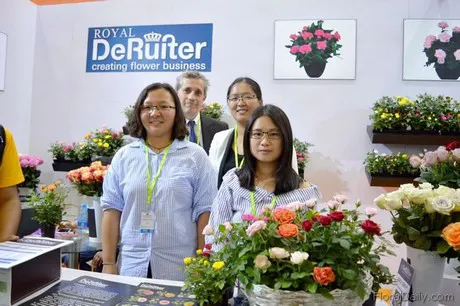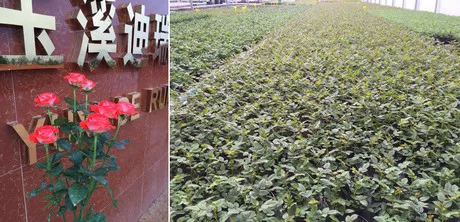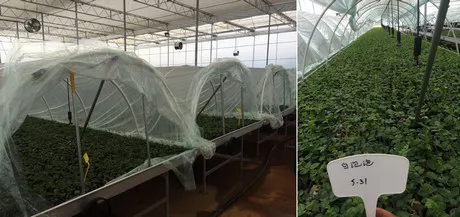The potted rose is increasing in popularity and therefore commercial cultivation becomes more interesting. However, the propagation and cultivation of this plant is quite challenging for many Chinese growers, even for the larger ones. As strong quality is ever more requireded, good products and cultivation support are needed. This is explained by Eduard Koks of Royal de Ruiter, a Dutch rose breeder.

Eduard Koks with the Chinese Royal De Ruiter team at the IPM Beijing in China.
Shift crops
Over the years, many Chinese growers shift crops, due to governmental changes. "Before Mr. Chi Jingping became president, about four years ago, many large scale growers were fully focused on the cultivation of plants for governmental occasions. These plants needed to be big, vigorous and suitable for large pots. However, when Jingping became president, he decided to quit spending money on these plants and therefore, these large growers had to adjust to the consumers' demands and often needed to shift crops. The consumer demands smaller plants in smaller pots. As one of the results, the potted rose gained in popularity and therefore became an increasingly interesting crop to cultivate."

Propagation location of Royal De Ruiter in China.
Difficult crop
However, over the last years, the production did not increase drastically. Why not? According to Koks, the main reason is the fact that this crop is difficult to propagate and cultivate. "Chinese growers often try to propagate their own crop. However, propagating potted roses is not an easy task and requires good knowledge of the product. Therefore, many growers are not able to achieve a high quality product, which is increasingly more demanded by the consumer. The same counts for the cultivating of the crop. It requires good knowledge and good techniques to achieve a good quality plant. So, even after delivering a good quality cutting, cultivation support is necessary", says Eduard.

Propagation location of Royal De Ruiter in China.
Greenhouse in China
In order to supply the Chinese growers with good quality starting material, Royal De Ruiter established a 2.3 ha sized greenhouse in China, last October. The greenhouse is equipped with 4000m2 rolling benches and a modern heating system, and potted roses are being propagated and supplied to growers all over China. The cuttings come from the mother stock from the nursery in the Netherlands. Next to propagation, it is also used as trial location to test cut- and potted roses. And in order to enable the grower to cultivate a high quality product, Royal De Ruiter supports its growers throughout the cultivation process.
For more information
Royal De Ruiter
Eduard Koks
Email: [email protected]
www.deruiter.com
